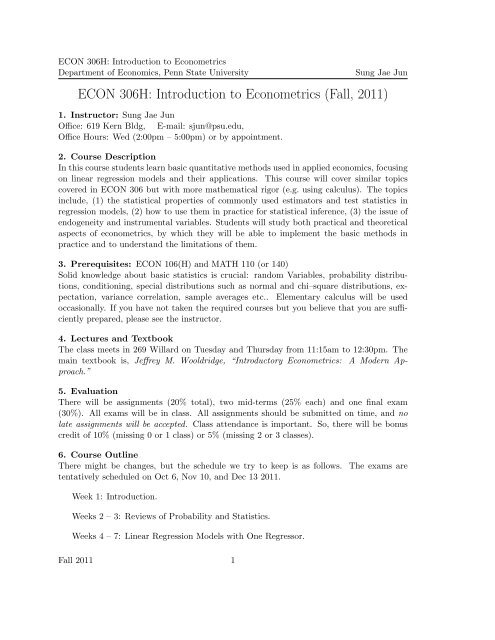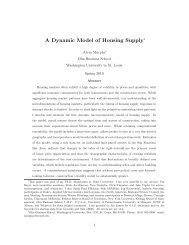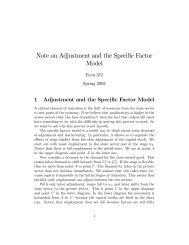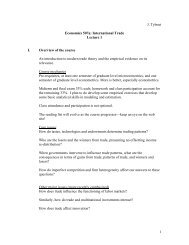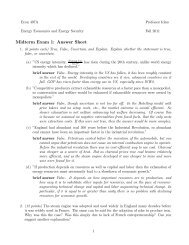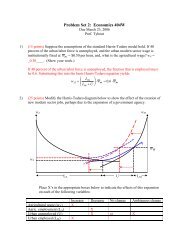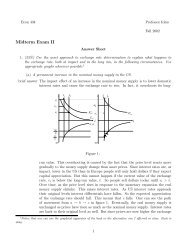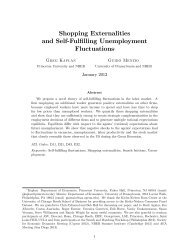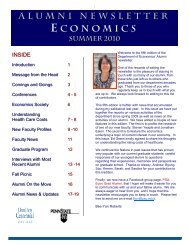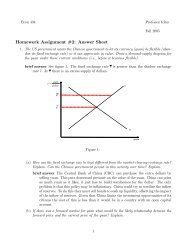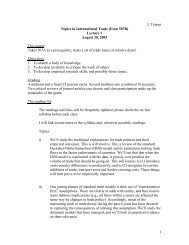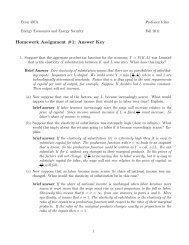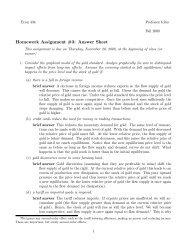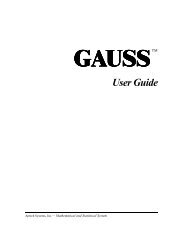ECON 306H: Introduction to Econometrics - Department of ...
ECON 306H: Introduction to Econometrics - Department of ...
ECON 306H: Introduction to Econometrics - Department of ...
You also want an ePaper? Increase the reach of your titles
YUMPU automatically turns print PDFs into web optimized ePapers that Google loves.
<strong>ECON</strong> <strong>306H</strong>: <strong>Introduction</strong> <strong>to</strong> <strong>Econometrics</strong><strong>Department</strong> <strong>of</strong> Economics, Penn State UniversitySung Jae Jun<strong>ECON</strong> <strong>306H</strong>: <strong>Introduction</strong> <strong>to</strong> <strong>Econometrics</strong> (Fall, 2011)1. Instruc<strong>to</strong>r: Sung Jae JunOffice: 619 Kern Bldg, E-mail: sjun@psu.edu,Office Hours: Wed (2:00pm – 5:00pm) or by appointment.2. Course DescriptionIn this course students learn basic quantitative methods used in applied economics, focusingon linear regression models and their applications. This course will cover similar <strong>to</strong>picscovered in <strong>ECON</strong> 306 but with more mathematical rigor (e.g. using calculus). The <strong>to</strong>picsinclude, (1) the statistical properties <strong>of</strong> commonly used estima<strong>to</strong>rs and test statistics inregression models, (2) how <strong>to</strong> use them in practice for statistical inference, (3) the issue <strong>of</strong>endogeneity and instrumental variables. Students will study both practical and theoreticalaspects <strong>of</strong> econometrics, by which they will be able <strong>to</strong> implement the basic methods inpractice and <strong>to</strong> understand the limitations <strong>of</strong> them.3. Prerequisites: <strong>ECON</strong> 106(H) and MATH 110 (or 140)Solid knowledge about basic statistics is crucial: random Variables, probability distributions,conditioning, special distributions such as normal and chi–square distributions, expectation,variance correlation, sample averages etc.. Elementary calculus will be usedoccasionally. If you have not taken the required courses but you believe that you are sufficientlyprepared, please see the instruc<strong>to</strong>r.4. Lectures and TextbookThe class meets in 269 Willard on Tuesday and Thursday from 11:15am <strong>to</strong> 12:30pm. Themain textbook is, Jeffrey M. Wooldridge, “Introduc<strong>to</strong>ry <strong>Econometrics</strong>: A Modern Approach.”5. EvaluationThere will be assignments (20% <strong>to</strong>tal), two mid-terms (25% each) and one final exam(30%). All exams will be in class. All assignments should be submitted on time, and nolate assignments will be accepted. Class attendance is important. So, there will be bonuscredit <strong>of</strong> 10% (missing 0 or 1 class) or 5% (missing 2 or 3 classes).6. Course OutlineThere might be changes, but the schedule we try <strong>to</strong> keep is as follows.tentatively scheduled on Oct 6, Nov 10, and Dec 13 2011.The exams areWeek 1: <strong>Introduction</strong>.Weeks 2 – 3: Reviews <strong>of</strong> Probability and Statistics.Weeks 4 – 7: Linear Regression Models with One Regressor.Fall 2011 1
<strong>ECON</strong> <strong>306H</strong>: <strong>Introduction</strong> <strong>to</strong> <strong>Econometrics</strong><strong>Department</strong> <strong>of</strong> Economics, Penn State UniversitySung Jae JunMid-Term Exam I : Tentatively Oct 6 2011.Weeks 8 – 12: Linear Regression Models: Extensions.Mid-Term Exam II: Tentatively Nov 10 2011.Weeks 13 – 15: Departing from the Usual Assumptions: Endogeneity.Final Exam (Comprehensive): Tentatively Dec 13 2011.7. Penn State Academic Integrity Policy (Office <strong>of</strong> the Dean’s website)1. Penn State defines academic integrity as the pursuit <strong>of</strong> scholarly activity in an open,honest and responsible manner. All students should act with personal integrity, respec<strong>to</strong>ther students’ dignity, rights and property, and help create and maintain anenvironment in which all can succeed through the fruits <strong>of</strong> their efforts (Faculty SenatePolicy 49-20).2. Dishonesty <strong>of</strong> any kind will not be <strong>to</strong>lerated in this course. Dishonesty includes, but isnot limited <strong>to</strong>, cheating, plagiarizing, fabricating information or citations, facilitatingacts <strong>of</strong> academic dishonesty by others, having unauthorized possession <strong>of</strong> examinations,submitting work <strong>of</strong> another person or work previously used without informingthe instruc<strong>to</strong>r, or tampering with the academic work <strong>of</strong> other students. Students whoare found <strong>to</strong> be dishonest will receive academic sanctions and will be reported <strong>to</strong> theUniversity’s Judicial Affairs <strong>of</strong>fice for possible further disciplinary sanction.8. Disability Access Statement (Office <strong>of</strong> the Dean’s website)1. The Pennsylvania State University encourages qualified people with disabilities <strong>to</strong>participate in its programs and activities and is committed <strong>to</strong> the policy that allpeople shall have equal access <strong>to</strong> programs, facilities, and admissions without regard<strong>to</strong> personal characteristics not related <strong>to</strong> ability, performance, or qualifications asdetermined by University policy or by state or federal authorities. If you anticipateneeding any type <strong>of</strong> accommodation in this course or have questions about physicalaccess, please tell the instruc<strong>to</strong>r as soon as possible.9. <strong>Department</strong> Policy on Missed Evaluative EventsFall 2011 2
<strong>ECON</strong> <strong>306H</strong>: <strong>Introduction</strong> <strong>to</strong> <strong>Econometrics</strong><strong>Department</strong> <strong>of</strong> Economics, Penn State UniversitySung Jae Jun1. Valid Excuses and Missed Evaluative Events: During the course many possible situationsmay arise that would result in your inability <strong>to</strong> attend class, attend exams,or perform at a minimally acceptable level during an examination. Illness or injury,family emergencies, certain University-approved curricular and extra-curricular activities,and religious holidays can be legitimate reasons <strong>to</strong> miss class or <strong>to</strong> be excusedfrom a scheduled examination.(a) In the case <strong>of</strong> your own illness or injury, a note from a physician, physician’sassistant, or a nurse–practitioner is required. Be advised that University HealthServices cannot provide such verification unless they have provided treatment.Further, the note must be provided <strong>to</strong> the instruc<strong>to</strong>r within one week <strong>of</strong> themissed course event (in cases <strong>of</strong> extended illness or incapacity, the note must beprovided within a week <strong>of</strong> the end <strong>of</strong> your illness or incapacity, and it shouldspecify the period <strong>of</strong> your inability <strong>to</strong> attend the course).(b) With regard <strong>to</strong> family emergencies, you must provide verifiable documentation<strong>of</strong> the emergency. Given the vast array <strong>of</strong> family emergencies the instruc<strong>to</strong>r willprovide precise guidance as <strong>to</strong> what constitutes adequate documentation. Unlessthe emergency is critical you should notify the instruc<strong>to</strong>r in advance <strong>of</strong> yourabsence from the scheduled course event. In cases <strong>of</strong> critical emergencies, youmust notify the instruc<strong>to</strong>r within one week <strong>of</strong> your absence.(c) For University–approved curricular and extra–curricular activities, verifiable documentationis also required. The student should obtain from the unit or departmentsponsoring the activity a letter (or class absence form) indicating theanticipated absence(s). The letter must be presented <strong>to</strong> the instruc<strong>to</strong>r at leas<strong>to</strong>ne week prior <strong>to</strong> the first absence.(d) In the case <strong>of</strong> religious holidays, the student should notify the instruc<strong>to</strong>r by thethird week <strong>of</strong> the course <strong>of</strong> any potential conflicts.(e) It is your responsibility <strong>to</strong> provide timely notification <strong>to</strong> the instruc<strong>to</strong>r <strong>of</strong> auniversity-approved excused absence prior <strong>to</strong> missing an evaluative event. Afterproviding such notification, the usual policy is <strong>to</strong> reweight future evaluativeevents. However, if you wish <strong>to</strong> take a make-up <strong>of</strong> the evaluative event thenit must be scheduled and completed prior <strong>to</strong> the date <strong>of</strong> your absence, unlessyou are medically unable <strong>to</strong> do so. If you have questions, please contact yourinstruc<strong>to</strong>r.Fall 2011 3


